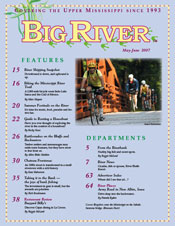|
May-June 2007 River News
Excerpts and Links to more information
Cicada Summer
Residents, entrepreneurs and public agencies in eastern Iowa and northern Illinois are preparing for a massive emergence of 17-year cicadas in May and June. Unlike the annual cicadas that come out to sing every summer, these periodic cicadas emerge only every 17 years, usually all at once and in greater numbers. Some areas may see as many as 1.5 million cicadas per acre.
The Ravinia music festival in Highland Park, near Chicago, changed its performance dates from June to July to avoid competing with the cicadas’ loud buzzing, which goes on all day.
The state of Illinois is sending a “Cicada Mobile” to schools, festivals and farmers markets to educate people about the bugs, which don’t sting or bite or devour crops like the locusts people sometimes mistake them for, although the 17-year cicadas do make people anxious, perhaps because of their big red eyes.
According to Dr. Donald Lewis, Iowa State University entomologist, cicada males sing by using strong muscles to “vibrate two shell-like drums on the sides of the abdomen. The resulting high-pitched, rapid clicks resonate through air sacs and other structures to control sound volume and quality. The upward angles of the wings form a megaphone-like chamber that further controls the sound.”
As soon as ground temperatures rise to a consistent 64 degrees, the cicadas tunnel out of the ground, shed their skins and fly up into the trees, where they begin a period of eating, singing, mating and laying eggs. Then adults die, the eggs hatch and the young eat and drop to the ground, where they dig tunnels and crawl underground for 17 years, living on the sap of tree roots and slowly growing to maturity. The 17-year cicada is one of the longest-lived insects in the world. Only about 118 of these big hatches have occurred since the year 1 A.D.
Get more information and compare songs of various cicadas, at the University of Michigan Museum of Zoology, Insect Division website. Link
Sackhouse Saved
St. Paul — The St. Paul Housing and Redevelopment Authority approved a $9.5 million rehabilitation project March 14 to convert an abandoned grain terminal on the riverfront to a restaurant and interpretive center.
A farmers’ cooperative built the “headhouse and sackhouse” structure in 1931, the first of its kind in the United States. The six-story headhouse is all that remains of the Minnesota Farmers Union’s 90-elevator complex. It was designed to load grain onto barges, providing an attractive alternative to the rail transport then favored by grain companies.
Construction of the headhouse and sackhouse helped convince Congress to authorize a nine-foot-deep shipping channel. It also countered a key argument against creating a lock-and-dam system and nine-foot-deep channel on the Mississippi: Why send barges all the way to St. Paul when it had nothing to ship back downstream?
After construction of the headhouse and sackhouse, wheat and other grain from Minnesota and the Dakotas could be shipped from St. Paul, if St. Paul could swipe some of the business from the rail yards at Minneapolis.
A farm cooperative had built grain elevators along the river in St. Paul in 1915, but low river levels foiled Mississippi transport, and traffic through the new Panama Canal all but halted Mississippi River shipping.
The building’s first floor will house the restaurant, and the second floor will house the interpretive center and an overlook of the Mississippi. Construction is scheduled to begin this year and be complete in May of 2008. Link
Campgrounds Open
Brainerd, Minn. — Campgrounds along the Mississippi River above Minneapolis will offer full services again this year after budget cuts reduced services in 2006.
The Army Corps of Engineers St. Paul District said it would open, operate and take reservations for all six of its Mississippi River Headwaters’ campgrounds in 2007, and all sites will again have showers, running water, dump stations and fish-cleaning facilities.
Last year, facing budget shortfalls, the Corps mulled whether to close some campgrounds, but it finally decided to open all of the sites with reduced services.
The St. Paul District’s six campgrounds in northern Minnesota are Gull Lake Dam and Recreation Area near Brainerd; Cross Lake Dam and Recreation Area in Crosslake; Sandy Lake Dam and Recreation Area near McGregor; Leech Lake Dam and Recreation Area in Federal Dam; Pokegama Dam and Recreation Area in Grand Rapids; and Winnibigoshish Dam and Recreation Area near Deer River.
Campers can reserve Army Corps of Engineers campsites by calling 877-444-6777 (TDD 877-833-6777) or online. Link
Geocaching on the Refuge
Winona, Minn. — Geocaching, the popular activity in which participants hide objects outdoors so others can find them using their Global Positioning System (GPS) units, is prohibited on the Upper Mississippi River National Wildlife and Fish Refuge. So, in order to allow a geocaching-like experience, the refuge staff has developed an alternative game in which fans follow clues and get rewards for discovering answers.
Clues and coordinates are posted on the refuge website. Players explore the refuge to solve the clues, write down the answers, then return to the refuge office with their tallies to receive a reward for correct answers. They are also encouraged to take photos of themselves, some of which will be posted on the website.
You need a GPS unit to play. Clues on the site will take players to landmarks, features or signs reaching from Weaver to Winona on both sides of the river. Students and experienced geocachers helped test the high-tech scavenger hunt. Link
|


